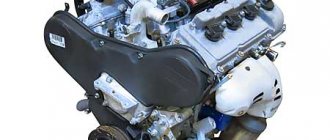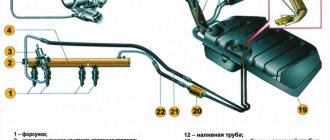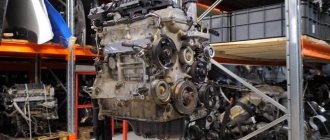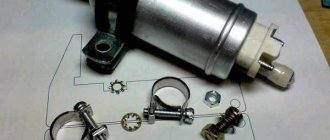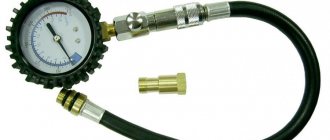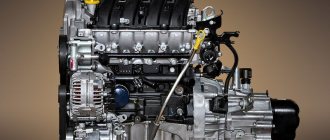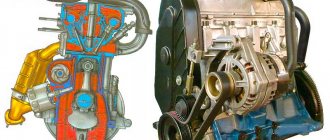Advantages and disadvantages of a diesel engine
A gasoline engine is quite inefficient and is only able to convert about 26% of the fuel's energy into useful work. A diesel engine typically has an efficiency of 36%.
Diesel fuel is usually cheaper, and the fuel consumption of a diesel engine is less than that of a gasoline engine. The diesel engine produces high torque over a wide rpm range, making a diesel car more responsive than a gasoline-powered car.
Compared to gasoline engines, diesel engine exhaust typically contains less carbon monoxide (CO). An important safety aspect is that diesel fuel is non-volatile (i.e. does not evaporate easily) and thus diesel engines are much less likely to catch fire, especially since they do not use an ignition system.
The obvious disadvantages of diesel engines are: the need to use a high-power starter, crystallization of paraffins in diesel fuel at low temperatures, difficulty in repairing fuel equipment (since high-pressure pumps are devices manufactured with high precision). Diesel engines are also sensitive to fuel contamination by mechanical particles and water, which very quickly damage fuel equipment.
A diesel engine is more expensive to operate than a gasoline engine.
This is not entirely true. In terms of fuel costs, diesel is even more profitable than a gasoline engine due to the low (compared to gasoline) cost of diesel fuel and its lower consumption.
Of course, in the case of a diesel engine, it is recommended to change the engine oil and filters more often - every 5,000-7,000 km (and not every 10,000 km, as with gasoline engines).
But this fact does not always speak in favor of more expensive diesel maintenance - after all, the cost of consumables (oil and filters) depends on the specific model of gasoline or diesel engine.
The diesel engine is very demanding on fuel quality.
This is not entirely true. Indeed, the use of high-quality fuel is preferable for a diesel engine, but not as critical as for a gasoline engine.
The latter requires fuel with a certain octane number, is sensitive to additives that increase this same octane number, and to the presence of lead impurities. But for a diesel engine, it is usually enough that the diesel fuel is clean (without mechanical impurities) and without water.
Diesel engine life - why is it longer?
If you look at gasoline versions of power plants, you will be surprised by one simple truth - their service life has been significantly reduced. 10 years ago, a good engine could easily travel up to 300,000 km, and then after repair, drive another 200,000 km. Today, the service life of TSI units with turbines is 150,000 km in total, and the engines are often not repairable at all. In addition, immediately after the end of the warranty period, a lot of problems with the turbine begin. Diesel engines have the following advantages:
- the design is classic, the corporation did not introduce any serious experiments in turbocharging technologies and the production of main parts, so the diesel engine is more reliable and simpler;
- the motors are being repaired, so after the end of their service life it will be possible to safely carry out a major overhaul, install new factory parts and extend the life of the car;
- the electronics are simpler and more reliable, they are also classic and without significant experiments, as is the case with the TSI gasoline engine, nothing breaks and does not require replacement;
- driver reviews prove that a service life of 300,000 km is covered very easily with German diesel engines; this figure is achieved without repairs and additional investments;
- There is no downsizing problem during production, since a diesel unit emits approximately the same amount of harmful substances for virtually any volume of fuel combustion chambers.
What is a pump injector?
An injector pump is an element of the fuel system of a diesel engine in which an injector and a plunger pump are combined into one unit. Combining the pump and nozzle in one unit has significantly reduced the amount of fuel that is located between the pump plunger and the nozzle. This made it possible to reduce errors in the fuel supply process that occurred due to fuel compressibility and pressure fluctuations in the system when using separated fuel equipment.
To increase the accuracy of the pump injectors, they have built-in solenoid valves that are controlled electronically. The maximum operating injection pressure in this system is 2,050 bar.
The diesel engine often fails in winter and does not start.
This is not entirely true. Difficulties with operating a working diesel car in winter can only be associated with the formation of paraffin deposits in diesel fuel when the ambient temperature is too low. The use of so-called winter diesel fuel, the installation of various heaters (filter, fuel line, tank) and the correct use of depressant or antigel additives usually relieve the owner of such problems.
An important factor for trouble-free starting of a diesel engine in winter is also the presence of a powerful battery and the performance of glow plugs. With proper operation and appropriate preparation for winter, problems with a diesel engine do not arise.
A diesel engine is noisier than a gasoline engine.
This is not entirely true. A correctly tuned diesel engine is only slightly “louder” than a gasoline engine, which is noticeable only at idle. There is practically no difference in operating modes.
A noisy engine is a consequence of improper operation and evidence of possible malfunctions (primarily fuel equipment).
Lower operating temperatures
A diesel engine will operate at significantly lower temperatures than a gasoline engine. This is due to the fact that in a diesel engine, fuel combustion occurs with greater efficiency. Therefore, when ignited, less heat is generated.
Approximately 40% lower fuel consumption by diesel units to produce the same power is due to a higher compression ratio and injection features when supplying fuel to the combustion chamber (it does not occur until the piston is at the top of the stroke).
Why does a diesel engine need glow plugs?
A diesel engine is a piston internal combustion engine that runs on diesel fuel. The main difference between a diesel engine and a gasoline engine is the method of supplying the air-fuel mixture to the cylinder and the method of its ignition.
In a gasoline engine, fuel is mixed with intake air before entering the cylinder, and the resulting mixture is ignited at the required moment by a spark plug.
In a diesel engine, air is supplied to the cylinder separately from the fuel and then compressed. Glow plugs are needed to heat the air in the combustion chamber of a diesel engine. When the air is heated to the self-ignition temperature of the fuel (about 700-8000C), it is injected into the combustion chambers by nozzles under high pressure, mixed with compressed hot air and ignited.
The glow plugs only work when the engine starts; the rest of the time they are turned off. Starting a diesel engine without preheating the air is possible, but it is very difficult, especially in the cold season. This is why it is important to keep your glow plugs in good working order at all times.
If a car has black exhaust, it's a diesel.
This is wrong. Black exhaust can occur in both diesel and gasoline engines, but only if they are faulty. Black exhaust from a working diesel engine is allowed only during sudden throttle changes and during startup; in other operating modes, exhaust gases should be practically invisible.
The resource of a diesel engine is less than that of a gasoline engine.
This is wrong. The service life of a diesel engine can reach a million kilometers. Diesel engines are generally more durable than gasoline engines, which is explained by a more durable and rigid cylinder block, crankshaft, cylinder-piston group parts, cylinder head and the use of diesel fuel, which, unlike gasoline, is also a lubricant to a certain extent.
Running on synthetic fuel
If diesel is used, there will be no problems using synthetic fuel. Unlike a gasoline engine, in this case you won’t even need to make changes to its design. The popularity of biofuels such as biobutanol is gradually growing. New types of fuel are being developed on which gasoline engines can operate without breaking down. But diesel engines are initially capable of running on alternative fuels without additional modifications.
What is Common Rail?
The Common Rail power system has been used in diesel engines of production models since 1997. Fuel is injected into it from the common high-pressure fuel line at a pressure of 1,300-1,800 bar. The dosage is determined by the system’s electronic control unit, which takes into account data from a number of sensors: accelerator pedal position, fuel rail pressure, engine temperature, engine load, etc. Based on these readings, the computer determines the amount of fuel required for engine operation and the moment of its supply.
Engine life - what is it?
Among car enthusiasts, this concept refers to the effective operating time of the engine. That is, when the unit began to consume more fuel, the power decreased, various knocks and other extraneous sounds appeared during operation, the engine began to consume more oil, all this indicates that the engine’s service life has been exhausted, and it will need major repairs in the near future.
In order for the motor to operate efficiently, the owner is required to follow the operating rules. It is much easier to prevent possible problems in advance than to fix them urgently later.
High-quality motor oil and coolant will help improve the service life. You should also monitor the condition of the air filters. The car must undergo regular maintenance. It is necessary to prevent non-standard operating modes of the unit.
What is the service life of diesel engines?
By engine life we mean the number of engine hours (or mileage) that the engine must work before the first major overhaul. Most often, the engine resource ends when the crankshaft journals and CPG fail due to wear. ICE manufacturers indicate the service life of each model, but you need to understand that this indicator is very approximate, because operating conditions to obtain it are taken to be close to optimal. In reality, the numbers may differ greatly from those declared by the manufacturer.
What does the resource of a diesel engine depend on?
The first factor affecting engine life is the working volume of the cylinders. The larger it is, the longer the engine will last until overhaul.
The second factor is turbocharging. If you install a turbine, the power and torque of the unit will increase, but the service life will decrease.
The next factor is the condition of the CPG and timing valves. Here you can immediately indicate another “human” factor, namely, the operating mode of the vehicle, the choice of fuel and lubricant.
The fact is that the quality of fuel and oil, as well as the operating conditions of the engine, directly affect the condition of piston rings, pistons, valves and other important elements of fuel equipment. Thus, low-quality lubricant can cause scuffing on the cylinder bore; poor fuel can lead to soot and burnout of pistons and valves, which in any case will result in premature wear of the engine. And constant heavy loads on the internal combustion engine generally shorten its life by 2-3 times.
And another factor is the purpose of the engine. It goes without saying that the powerful engine of an expensive SUV will last longer than a regular diesel engine of a budget compact car.
Compared to gasoline engines
It is believed that diesel internal combustion engines are 2 or even more times more durable than gasoline engines. There are reasons for such statements.
For the production of diesel engines, materials are taken that are stronger than for gasoline engines, because They have a higher compression ratio. Thus, the cylinder block for a diesel engine is made of cast iron, and for a gasoline engine it is made of aluminum alloy. The standards and tolerances of diesel units are also set higher.
In addition, a diesel engine reaches maximum torque faster: it starts to pull well from 1.5 thousand rpm, while a gasoline engine needs to reach about 4 thousand rpm. As a result, the number of piston strokes of a diesel engine is smaller, which means that wear will occur later than that of a gasoline internal combustion engine.
So it turns out that under the same optimal conditions, a diesel engine can last longer than a gasoline engine. But in practice, it would be wrong to say that diesel is more reliable than gasoline units just because it has a longer resource.
The fact is that this is only true for heavy trucks. As for cars with a volume of up to 2.2. l, then their declared resource is practically no different from their gasoline counterparts. It is also worth considering the fact that repair and maintenance of diesel fuel equipment in some cases turns out to be an order of magnitude more expensive than the overhaul of a gasoline engine.
How to extend the life of a diesel unit?
If we take into account the factors influencing the engine life of a diesel engine, we can make a list of recommendations, the implementation of which will extend the life of the engine:
- follow the instructions for driving modes (do not unnecessarily load the engine and do not spin it to high speeds unless clearly necessary),
- do not sacrifice the quality of fuel and engine oil in favor of immediate savings,
- systematically monitor and maintain fuel and other internal combustion engine systems,
- monitor the condition and serviceability of the cooling system (diesels are very sensitive to overheating),
- think three times before increasing the power of the engine by chip tuning or installing a tuning box (all of this in most cases significantly reduces the life of the engine).
If you are particularly interested in the issue of increasing the service life of a diesel engine, we recommend that you read this article, which is equally relevant for both diesel engines and gasoline internal combustion engines.
1VD engine characteristics
| Production | Toyota Motor Corporation |
| Engine make | 1VD |
| Years of manufacture | 2007-present |
| Cylinder block material | cast iron |
| engine's type | diesel |
| Configuration | V-shaped |
| Number of cylinders | 8 |
| Valves per cylinder | 4 |
| Piston stroke, mm | 96 |
| Cylinder diameter, mm | 86 |
| Compression ratio | 16.8 |
| Engine capacity, cc | 4461 |
| Engine power, hp/rpm | 202/3400 235/3200 272/3600 286/3600 |
| Torque, Nm/rpm | 430/1200-3200 615/1800-2200 650/1600-2900 650/1600-2900 |
| Environmental standards | Euro-2 (Philippines, Vietnam) Euro-3 (Argentina, South Africa, New Guinea) Euro-4 Euro-5 |
| Turbocharger | IHI VB36 + VB37 Garrett GTA2359V |
| Engine weight, kg | 340 (automatic) 325 (manual) |
| Fuel consumption, l/100 km (for Land Cruiser 200) - city - highway - mixed. | 11.28.5 9.5 |
| Oil consumption, g/1000 km | up to 1000 |
| Engine oil | 0W-30 (2012+) 5W-30 10W-30 (before 2012) 15W-40 (before 2012) |
| How much oil is in the engine, l | 9.2 |
| Oil change carried out, km | 5000 |
| Engine operating temperature, degrees. | — |
| Engine life, thousand km - according to the plant - in practice | — 400+ |
| Tuning, hp — potential — without loss of resource | 300+ — |
| The engine was installed | Toyota Land Cruiser 200/70Lexus LX450d |
What is the service life of a diesel engine?
The concept of diesel engine service life means a certain number of engine hours that a new power unit of this type must be guaranteed to work. By the end of a diesel engine's life, it should be understood that further operation of the internal combustion engine becomes impossible without the first major overhaul of the power plant. Often, the total resource of the unit is directly related to how quickly critical wear of the crankshaft (crankshaft journal) and cylinder-piston group occurs.
Let us immediately note that the service life of a diesel and gasoline engine is greatly influenced by design features, as well as the individual operating conditions of a particular engine. The manufacturer determines the total declared resource of the internal combustion engine, taking into account the operation of the unit under conditions as close to optimal as possible.
Read in this article
What does the indicator depend on?
This figure is greatly influenced by the volume of the combustion chambers.
And the higher this indicator, the more positively it affects the service life. The condition of the cylinders and pistons plays an important role. For example, the integrity of the rings is negatively affected by the conditions of use. Carbon deposits and dust can act abrasively on parts and thus destroy them. The upper part of the cylinder also wears out quickly - gases and inner rings press on it, and lubrication may be insufficient.
Naturally, only the manufacturer can determine the service life of a diesel engine. Different cars and different engine models may have different performance. The higher the cost of the motor, the better it is. It is also important for what purpose the machine is used. If the car is raced, that's one thing, but if the car is used as a family car, that's another thing entirely.
Factors influencing motor life
The service life of a diesel engine depends on the working volume of the cylinders. The larger the engine capacity, the greater the chance of the engine working out the number of engine hours stated by the manufacturer before overhaul.
The second important factor is the presence or absence of turbocharging. There are cases when a simple atmospheric diesel engine survived up to a million kilometers without repair, and some record figures were even higher. Installing a turbine made it possible to increase the power and torque of the diesel unit, but the service life of turbodiesels was reduced. There are allegations that the development of fuel supply systems prior to direct injection also led to a reduction in service life.
The CPG and timing belt are quickly destroyed as a result of malfunctions or failures in the operation of high-precision diesel fuel equipment. Violations lead to the formation of deposits in the form of soot, burnout of pistons and valves. Poor quality oil or problems with the diesel lubrication system can lead to the formation of scoring on the cylinder surface and premature engine wear.
Maintaining the operating temperature of a diesel engine is essential to ensure that stressed parts are effectively cooled. The combustion chamber (the top of the cylinder) is subject to severe wear and tear as it must constantly cope with high pressure, friction and temperatures.
The planned life of each diesel engine model is determined by the manufacturer, taking into account various factors and the intended purpose of the vehicle. It is quite obvious that the powerful diesel engine of an elite SUV lasts longer under the same conditions compared to a budget diesel compact car.
How can you influence the service life of a diesel engine?
As you may have guessed, the service life of the engine depends not only on the material of its manufacture and technical projection characteristics, but also on the driver himself, or more precisely, on the correct maintenance of the power plant.
First of all, the driver must use for lubrication only high-quality oil that has passed special testing and is approved for use on a given type of engine. After all, the lubrication system is the “blood” of any engine and its life depends on its contents.
Oil for a diesel engine must be selected taking into account the applied loads. If you intend to use the engine in conditions close to extreme, it is recommended to fill only with oil with a high viscosity coefficient to avoid its dilution when the temperature rises. You can also find out by reading the technical data sheet for the power unit. It indicates all the characteristics of oils used on the engine under various conditions.
Experienced drivers know that a diesel engine is very sensitive to sudden increases in temperature. This phenomenon has a more serious impact than the quality of the oil being poured. To avoid overheating and increase engine power, you can install a turbo compressor connected to an intercooler, which will help maintain the engine at the temperature it needs.
That's probably all you need to know about the service life of a diesel engine. As you can see, the price to pay for a powerful and reliable motor is considerable, because you will have to stock up in advance on expensive spare parts and automotive chemicals that can save you from unnecessary expenses and preserve the life of the motor, even if quite large dust particles have flown into it.
When choosing another car, many are interested in the equipment, multimedia system, and comfort. The motor life of the engine is also an important parameter when choosing. What it is? The concept as a whole determines the operating time of the unit until the first major overhaul in its life. Often the figure depends on how quickly it wears out. But this is what is written in reference books and encyclopedias.
Diesel resource compared to gasoline internal combustion engines
There is an opinion that the service life of a diesel engine is up to two or more times longer than that of gasoline engines. Since the compression ratio of diesel engines is higher, materials of increased strength are used to manufacture diesel engines.
The cylinder block of a diesel internal combustion engine is made of cast iron, while aluminum alloys are widely used for gasoline engines. Parts of the cylinder-piston group and crankshafts of diesel engines are manufactured in accordance with higher standards and tolerances to increase their strength. The result is that, under optimal operating conditions, a diesel unit can operate longer than a gasoline unit without major repairs.
Difference in service life of diesel and gasoline engines
Initially, a diesel engine implies greater power and loads, which must certainly be supported by an increased service life of the power plant. Many diesel engines still power many modern gasoline-powered units. However, this does not always happen, since there are a lot of manufacturers of both diesel and gasoline engines. After all, if you compare an expensive gasoline engine made in Japan with a Chinese analogue of the famous diesel engine, then, of course, this “fight” will be far from being in favor of the diesel engine. However, the diesel engine is considered to be one of the most durable.
The main secret of any diesel engine can be considered. First of all, they are made of special cast iron, which has a high margin of safety and great resistance to wide temperature changes. Modern gasoline engines are made of aluminum to reduce weight, but at high speeds such an engine overheats, which leads to natural deformation of the cylinders,
In addition, this applies not only to the block. After all, all parts of a diesel engine are made of cast iron.
, which fundamentally explains its durable and reliable operation.
The last difference can be called the number of revolutions. After all, a gasoline engine runs one and a half times faster, which accelerates the wear of the piston group, and, consequently, leads to wear of the entire engine as a whole. Diesel engines have only 2000 operating revolutions per minute, which means a small piston stroke and slower wear.
Increasing diesel engine life
The service life of the engine depends on the quality of diesel engine oil, timely maintenance, serviceability of the diesel engine fuel system and other internal combustion engine systems. Diesel units are also extremely sensitive to overheating, which requires constant monitoring of the health of the cooling system.
It is important to follow the instructions and recommendations while driving, not to spin the diesel engine to high speeds unless absolutely necessary. Refueling with low-quality fuel can lead to detonation, which quickly causes destruction of both gasoline and diesel engines.
It should be added that interventions carried out to increase the power of a diesel unit using chip tuning or installing a tuning box often lead to a reduction in the life of the diesel engine. The video below provides recommendations for a gasoline engine, but these tips are also quite relevant for a diesel unit.
List of the most reliable gasoline and diesel engines: 4-cylinder power units, in-line 6-cylinder internal combustion engines and V-shaped power units. Rating.
What determines the service life of a diesel engine turbocharger? Features and recommendations regarding the operation and repair of turbines with variable geometry.
Line of Hyundai/KIA CRDi diesel engines: strengths and weaknesses of engines of this type, features of operation, repair and maintenance.
Why is it necessary to break in a new diesel engine? How to properly break in a car, basic recommendations and instructions. How many kilometers does it take to break in a car?
Features of operation and maintenance of an internal combustion engine. What needs to be done to ensure that the engine runs as long as possible without a belt.
What is the difference between a naturally aspirated engine and a turbo engine? Design features, power, operating features. The main pros and cons of atmospheric engines.
Let's sum it up
Volkswagen cars are a respected class in Russia. Today, the demand for all units has leveled off; buyers no longer blindly give preference to gasoline engines, as they are aware of their intricacies and possible operational problems. Diesel units received due attention in the Russian Federation after they went into decline in Europe. Some important factors contributed to the increase in demand, such as lower prices and good reviews from owners. If you buy a new diesel engine, you will be able to not worry about possible problems and disadvantages of its operation for about 300,000 km.
However, there are also disadvantages to heavy fuel units. The problems are that such technologies are too delicate, they are sensitive to factors of poor maintenance or not the best fuel. Therefore, there is no need to talk about the absence of troubles. VW specialists themselves admitted that today developments in the direction of internal combustion engines are losing their meaning. All investments are directed into the new field of electric vehicles, and heavy fuel units, like gasoline ones, are simply given the necessary versions to fit into existing environmental standards. So the choice is yours. What do you think about Volkswagen diesel units?
Additive for diesel engines RESURS DIESEL
RESURS DIESEL is used to restore and protect against wear of modern diesel engines, including turbocharged ones.
- Stable in lubrication systems with filters and centrifuges.
- Suitable for turbocharged diesel engines
- Prevents oil starvation
- Protects the turbocharger from overheating
- Reduces oil waste by 5 times
- Saves fuel up to 7-10%
RESURS DIESEL is used to restore and protect against wear of modern diesel engines, including turbocharged ones.
RESURS nanoparticles are an alloy of copper, tin and silver. Under the influence of pressure and temperature, they fill microcracks and chips, forming a new metal layer.
Restoring the cylinder walls:
- blocks leakage of working gases from the combustion chamber,
- increases compression in the chamber
- and eliminates oil waste.
The particle size of the remetallizant is less than 1 micron. They do not clog the oil filter and do not change the viscosity of the oil.
In diesel engines, the turbine receives more energy.
We live with you, friends, in an amazing time, when literally before our eyes, atmospheric engines are disappearing from the world. They are being replaced by turbo engines, which are much more efficient and powerful than their predecessors. Thus, very soon, most automakers will completely abandon conventional power units in favor of the latest turbo technologies.
From the very beginning of these turbines, engineers were faced with a certain problem that was related to the power supply of these turbochargers. As a rule, the turbine impeller itself rotates due to the energy received from the exhaust gases of the car. If we compare gasoline and diesel cars with each other, then the turbines in diesel engines operate much more efficiently, since in a diesel car the amount of exhaust gases per generated volume is much greater than in a gasoline unit. It is for this reason that the turbocharger(s) of a diesel engine produces maximum power much faster and earlier than gasoline cars. That is, already at low speeds, owners of diesel cars begin to feel the maximum power of the car and its torque.
Video about RESURS
Filled with RESURS UNIVERSAL and measured the compression
The engine runs without oil. How? (Academeg)
RESURS - in-place engine rebuild (Academeg)
Properties
- Increases engine efficiency
- Increases compression up to 40%
- Stops oil waste
- Prevents dry friction under high loads, overheating and cold starts.
- Extends engine life up to 20,000 km and turbocharger up to one year.
- Saves fuel up to 7-10%
Indications for use
- Fuel consumption exceeds the level declared by the manufacturer by 10% or more;
- Reduced or unbalanced compression;
- Oil loss is more than 150 g per 1000 km;
- Increased noise and vibration of the motor;
- Mileage over 60,000 km.
- It is advisable to change the oil and filter
- warm up the engine to operating temperature and turn off
- shake the bottle vigorously for 20-30 seconds
- pour the contents of the bottle into the oil filler neck
- let the engine idle for 10-15 minutes.
Dosage
It is recommended to use 1-4% RESURSa of the oil volume
You can purchase products in the following ways:
VAZ
Cars of this domestic brand used to have a service life of 130 thousand km. But now the situation is gradually changing. AvtoVAZ is releasing new engines that are characterized by smoother and quieter operation.
But still, cars in this segment are economy class, so it’s simply pointless to wait for anything here. In production they are trying to make the design cheaper. Inexpensive materials, assembly, attachments - all this significantly affects durability.
But at the same time, the new VAZ engines, the service life of which, according to engineers, is 500 thousand km, work quite well. Perhaps this figure should be a little less, about 300 thousand, and even then in a quiet driving mode, but this is already the result.
The figure that reflects the service life of the vehicle is generally not as important as high-quality and regular maintenance of the unit and the vehicle. No matter how high the reliability indicator is, it can easily be reduced by low-quality oil, poor fuel, and improper maintenance. It doesn’t matter at all what the engine’s service life is. It is important to monitor the condition of the units correctly and in a timely manner. and then it will not need repairs in the near future.
Engine life is the amount of mileage a vehicle can travel before major repairs of its power unit.
In turn, a major overhaul of an engine is a complex process, during which it is completely rebuilt and brought to a state where its technical characteristics are as close as possible to factory parameters.
The question of the need for a major overhaul of the car’s power plant is raised by its owner after the following began to be observed during its operation:
- significant loss of power;
- strangers;
- increased fuel and engine oil consumption.
It is the combination of all these factors that indicates that the engine’s life has been exhausted and the latter requires serious repairs.
avtoexperts.ru
The eternal question - which type of engine to choose, gasoline or diesel - has been tormenting Russian motorists for decades. Each of the options has its positive and negative sides, which we are going to consider today to help car enthusiasts make a balanced and informed choice.
For convenience, we will divide our “clarification of the relationship” between gasoline and diesel power plants into several points: power and performance, efficiency, resource, maintenance and operation.
Which motor is more efficient?
One of the characteristics that buyers most often pay attention to is the power of the car's engine. Moreover, this characteristic does not depend on the type of fuel on which the engine runs, but in our case, since we decided to compare diesel and gasoline power plants, let’s say that it is often gasoline engines that have the upper hand in terms of the number of “horses”. Even if the unit is equipped with a turbocharger, the power of a gasoline turbo engine will still be higher than that of a diesel engine.
It would seem that there is nothing special to talk about here: anyone who wants a powerful “iron horse” will first of all look towards a car with a gasoline engine, because it has more “horses” under the hood - if we compare engines of the same volume. And it turns out to be not entirely right.
A car with a powerful gasoline engine is suitable for those who love speed, fast acceleration, in a word - to feel like the king of speed somewhere on the highway. But a car with a gasoline engine, while having excellent dynamic characteristics, loses to a car with a diesel engine in traction. Yes, yes, if your gasoline car goes off-road, its torque will not be enough to easily get out of the mud. But a diesel car, having a higher torque, which is achieved at much lower speeds than a gasoline unit, will cope with this task much more confidently - due to the fact that the “shelf” of this very torque is flat on a diesel engine.
In cars with a gasoline engine, the maximum torque is usually less, and it is achieved at higher speeds. For excellent dynamics, this, we repeat, is great (it’s not for nothing that the vast majority of sports cars have gasoline engines), but when overcoming off-road conditions, preference should still be given to units running on “heavy” fuel - and that is why SUVs and special equipment are equipped with diesel power plants.
Speaking about the efficiency of diesel and gasoline engines, we can say that here the former win over the latter - after all, to overcome the same section of the road, it does not matter whether it is a good high-speed highway or off-road, a car with a diesel engine will spend less fuel than car with a gasoline unit. But! Due to its power and more outstanding dynamic characteristics, a car with a gasoline engine will get you from point A to point B much faster. Will fuel consumption be higher? Hmm, well, you have to pay for speed.
Are there any disadvantages to Volkswagen diesel units?
Today, objectively, these engines have more advantages than disadvantages. However, it is worth remembering some nuances that are constantly found in reviews. It is no secret that heavy fuel installations save money only for their first owner, who bought the car from a dealership. Used cars with 10 years of driving experience in Russian conditions will no longer provide most of the advantages mentioned above. But there can be many disadvantages in such engines:
- Service cost. On average, the price of regular maintenance turns out to be 2 times higher than when carrying out maintenance of a gasoline engine of the same power and class from the same concern.
- Fuel requirements. If you pour low-quality diesel fuel into the tank, it will be expensive to clean the system from contaminants. This will also cause the failure of all car systems on the road and the need to overpay for a tow truck.
- Requirement for oil. It is enough to fill in the wrong oil several times in a row to get maximum problems with piston wear, as well as subsequent expensive repairs.
- Prices for spare parts. Components for diesel engines are traditionally more expensive, but this disadvantage may soon become irrelevant, as the market is flooded with these installations and spare parts.
- Vibration. With a mileage of over 100,000 km, even the most elite cars with such units begin to experience vibrations and other troubles. This is due to the very nature of such engines.
In each case, you have to risk something in order to get certain benefits. When buying a gasoline engine, you risk resources to get power and comfort. In the case of a diesel engine, you will get much less horses, but greater fuel economy, a significant improvement in overall resource indicators and efficiency. But at the same time, maintenance costs and certain risks of specific breakdowns will increase. Therefore, the decision should be made according to your own priorities.
